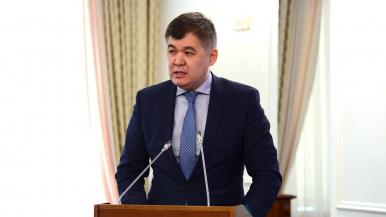ASTANA – Kazakh medical organisations should be headed by professional managers, said Healthcare Minister Yelzhan Birtanov at a Feb. 6 government meeting. He reported on measures to develop corporate governance and management in healthcare facilities.
“To date, most healthcare organisations in Kazakhstan have already been transferred into legal forms promoting the introduction of elements of corporate governance, such as enterprises with the right of economic management with supervisory boards,” he said.
An assessment of the ministry’s pilot medical organisations showed higher efficiency in the facilities that implement corporate governance principles compared to those that do not follow them.
To date, 750 of 840 public health organisations are to be transferred to the programme with the right to engage in economic activities. By the end of 2017, 618 enterprises were moved and the remainder will be switched this year.
The regional governments actively engage in providing facilities with organisational and methodological support and intend to create collegiate management bodies (supervisory boards), said Birtanov. In 2017, 352 bodies with public and business representatives were created.
A regional rating on executing corporate governance principles, taking into account the creation and full operation of the supervisory boards, was devised last year.
“We see that Astana, Almaty, West Kazakhstan and Karaganda regions have a high level,” said Birtanov.
He added the question of training professional healthcare managers remains urgent. The industry employs about 3,000 top managers, yet 60 percent of organisation heads have higher medical education without professional management education. Only 13.5 percent have a master’s degree.
“Medical organisations should be headed by professional managers. To this end, a new Health Management master’s programme was introduced; training programmes and a standard curriculum for the preparation of masters were developed,” he said.
Doctors’ salaries are one of the main indicators of management efficiency. According to the statistics committee, the national average monthly salary for a medical specialist is 159,307 tenge (US$493.80); the nominal employee wage, 147,988 tenge (US$458.70).
Birtanov noted work will continue to develop corporate governance and management. Plans are underway to legislatively consolidate medical organisations’ principles and concepts.
Corporate governance at macro and microeconomic levels is one of the decisive factors to successfully develop the national economy of any country, according to International Finance Corporation expert and World Bank representative Adalyat Abdumanapova. She focused on two points underlining the importance of corporate governance in Kazakhstan.
“Based on our experience as an international investor, we came to the conclusion that the successful development of business and attracting investments directly depends on the availability of proper corporate governance practices,” she said.
Abdumanapova believes Kazakhstan is working progressively to improve the corporate governance system, as the health sector is usually one of the most attractive investments.
“Traditionally, historically, the concept of corporate governance has evolved as a tool for private corporations. However, over the last few years, special attention has focused on the companies with state participation. As expected, these companies are able and even responsible for creating a positive example that local companies will follow,” she said.

